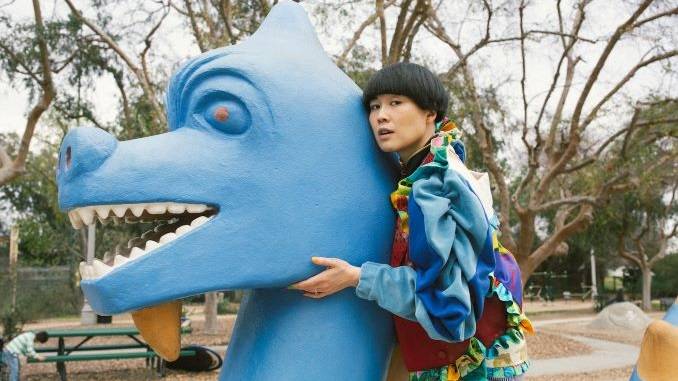Atsuko Okatsuka on Joy, Trauma and Sticking Up for the Underdogs
Photographer: Fanny Chu / Designer: Janelle Abbott
Comedian-actor-writer Atsuko Okatsuka’s third COVID winter is off to an amazing start, and that’s no joke. She’s on her first national solo headlining tour, can be seen in a Chobani ad, and stars in a couple of upcoming projects executive produced by Stephen Colbert: the Comedy Central animated series Fairview, which debuts on Feb. 9 after South Park, and the upcoming animated feature Washingtonia for Paramount+.
But probably her greatest accomplishment of the young year is accidentally starting the now-viral #dropchallenge on Tiktok in early January.
With a love of dancehall (which she’s taught professionally) and a penchant for posting her twerking skills online, Okatsuka shared a video of herself sultrily squatting in random locations around Los Angeles’s Little Tokyo neighborhood. The TikTok was set to Beyoncé’s “Yoncé”/“Partition” and featured her usual squad: her beloved Grandma Li (@AtsukosGrandma) at her side and Okatsuka’s husband Ryan Harper Gray behind the camera.
She innocuously asked people to show her their moves, and they’ve most certainly responded. Doctors and nurses dropped in hospitals, hairstylists squatted in salons and shoppers loved recording in produce aisles. Even Saturday Night Live got in on the challenge this past weekend, with cast members including Bowen Yang, Aidy Bryant and Kate McKinnon and guest Peyton Manning showing off their squat game.) The social media challenge encapsulates Okatsuka’s comedy style perfectly: It’s surprising, odd and joyous.
Okatsuka’s humor has a childlike quality to it, with stage persona informed by a complex and challenging upbringing. During a recent interview with Paste in Okatsuka’s L.A. backyard, she was refreshingly frank, honest and side-splittingly funny even when discussing darker topics that many people would rather avoid.
Those who’ve been following her career know that Okatsuka was born in Taiwan and lived in Japan for a few years to parents who met on a Japanese dating/game show, which inspired her own podcast and live show Let’s Go, Atsuko! a (woke) Japanese Game Show. “My parents meeting on [a game show] is kind of the shame of the family,” Okatsuka cracks. “My grandma knows a little more as she’s the one who signed my mom up. My mom was turning 30 or something … and you know how that means you’re dead, right?” she adds. “If you’re in your 30s and don’t have a boyfriend yet, I mean…shoot…just go get some cats. Good luck. You’re alone forever.”
Her mom and dad had a quick courtship, communicating with each other in mostly broken English, but were divorced about a year later. Her mother’s mental illness—undiagnosed schizophrenia—played a factor. “It was suddenly a lot for her to be in a new country, no friends, barely speaks the language and now is a stepmom to two teenagers,” she says. “All that stuff [hallucinations and the voices] flared up after she gave birth to me.”
With her mother struggling with mental illness, her grandmother made the decision to move to the U.S., but things didn’t get much better when Okatsuka arrived in Los Angeles. The three women lived in her uncle’s cramped garage and remained undocumented for seven years. “A garage is not enough space for schizophrenia and an eating disorder, which I had.”
-

-

-

-

-

-

-

-

-

-

-

-

-

-

-

-

-

-

-

-

-

-

-

-

-

-

-

-

-

-

-

-

-

-

-

-

-

-

-

-








































